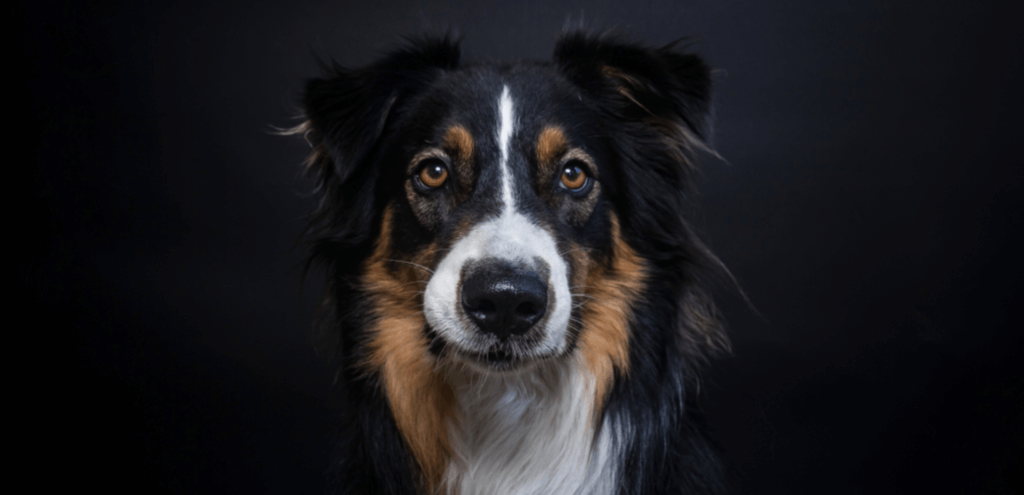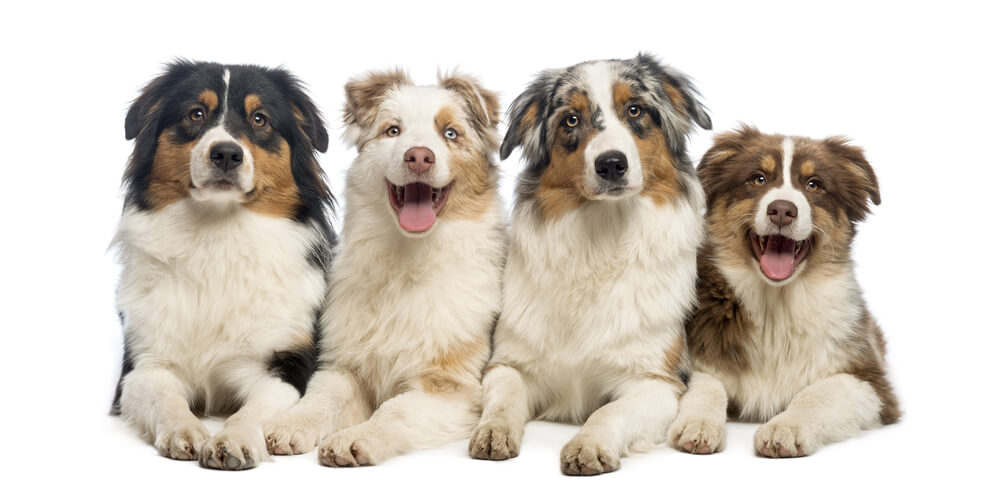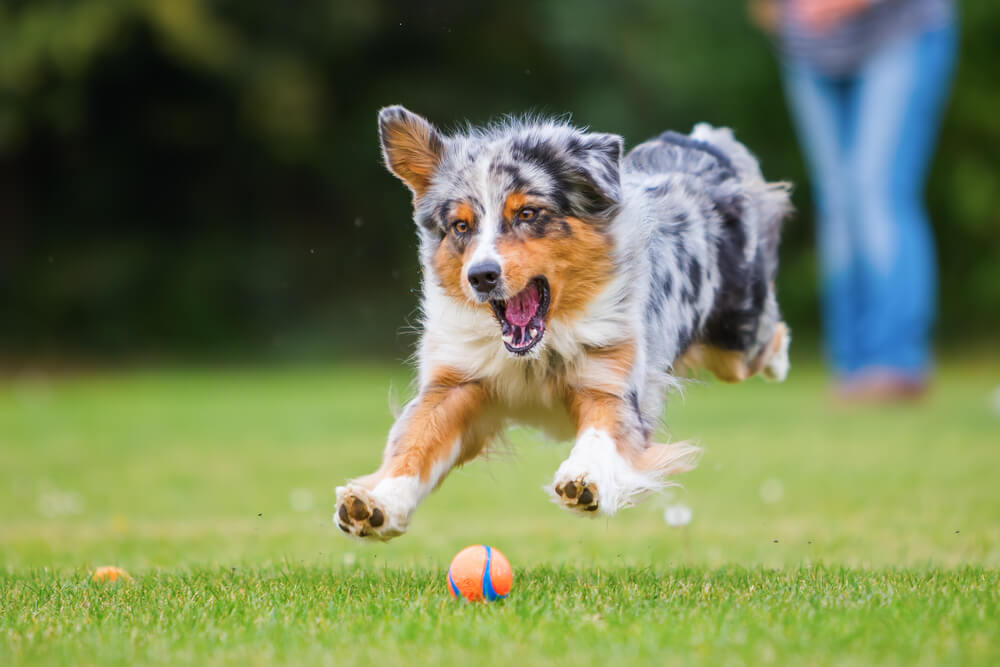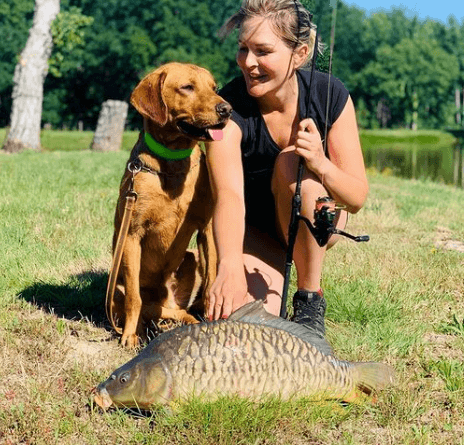🦴 Updated on July 12th, 2023

Many people question, are Australian Shepherds aggressive? Whether an Australian Shepherd is aggressive or not is tough to answer because aggression stems from triggering events that have happened in the dog’s lifetime.
I have two Australian Shepherds. My girl Ruby came from a breeder, and I adopted her at eight weeks old. She does not show any signs of aggression because we endured puppy training and early socialization.
However, my boy Duke shows many signs of aggression. I got him about a year ago from the pound.
Since Duke grew up with abuse and wasn’t properly trained, we have struggled with many aggressive traits. Luckily, I’m an experienced dog trainer and have worked very hard with Duke to get him on track.
Australian Shepherd Temperament
No dog is born with aggression, so the Australian Shepherd is not typically a dangerous or aggressive breed. However, many working dogs get a bad rap because of their history and natural instinct to herd and be dominant, including the Australian Shepherd.
An Australian Shepherd has naturally energetic and boisterous personalities, making them great companions for children and family households.
Australian Shepherds aren’t ordinarily aggressive unless they have a reason to be; due to their herding desire, they can become highly protective over their loved ones. This protectiveness might lead to aggression if they were not adequately socialized during puppyhood.
Are Australian Shepherds Good With Other Dogs?
Australian Shepherds were sheepdogs who herded cattle as one of their working tasks. Often, the Australian Shepherd will herd its family members to bond.
When you throw another dog into the group, your Australian Shepherd will want the dominant role, which is where aggressive attitudes will break out.
So, do Australian Shepherds get along with other dogs? The answer depends on a few factors.

Unless your Australian Shepherd was raised with the same breed or another dog, you can bet they may become aggressive towards the newcomer. However, if you’re looking to add another canine to the family, laid-back dogs that represent a non-alpha behavior are best for Australian Shepherds.
Are Australian Shepherds Aggressive?
The Australian Shepherd is an “aim-to-please” type of breed, so they are easy to train and highly intelligent when it comes to their temperament. However, they may guard their dog food, toys, and anything they believe is their property because of their instinctive aggression.
Since Australian Shepherds are working herd dogs, they need to be mentally and physically challenged; otherwise, aggressive habits will result from boredom or frustration. They are bossy, pushy, and assertive as they strive for the dominant role.
What Can Make Australian Shepherds Aggressive?
While it may seem as though your Aussie is pushing your buttons, they are stubborn breeds that strive for constant attention and need affection.
When trained and socialized correctly, the Aussie is generally well-mannered and has a good temperament. However, Australian Shepherds need a dominant owner and are not recommended for first-time owners.
Some things that can make an Australian Shepherd aggressive are:
- Perceived aggression through herding behaviors
- When someone is unfamiliar
- Stress and anxiety
- Improper socialization
- Pain or illness
- Territorial aggression with belongings
- Lack of exercise or mental challenges
Are Australian Shepherds Aggressive Towards Humans and Strangers?
Unless your Aussie feels or becomes triggered by the above causes, they will not be aggressive towards any human when given the appropriate guidance and nurturing from puppyhood.
As long as you are consistently mentally challenging your Aussie, they will always want to please you, leaving no room for aggressive or destructive behaviors.
However, they are more cautious and reserved when it comes to strangers due to their protective personalities.
On the other hand, they are great with children due to their protective nature. Your Aussie will play with, run with, and entertain your children all day.
What To Do During an Aggressive Episode?
If you have adopted an Australian Shepherd as a pup and have undergone the appropriate socialization and training it needs, then you have nothing to worry about.
However, if you have adopted an older Aussie with triggering signs of aggression, the first thing you must do is find the root cause for why they’re acting out.
Once you find the route (shown through triggers), you can start reverse training methods and work on committing to the training your Aussie needs to get better and more socialized.
During an aggressive episode, here are some things you can do.
Remain Calm
Remaining calm in an aggressive episode is the most important thing to remember. If you are hostile, angry, tense, or engage with your Aussie with a loud voice, that’ll only fuel their fire.
The trick is to stay calm to help your dog understand that there is no threat. They will feed off your energy and know that you are in control which will help them relax.
Avoid Eye Contact
Eye contact with a dog means you’re challenging them. If you hold an Australian dog’s stare, they will attack out of fear and dominance.
Instead, shield your Aussie from whatever has triggered them and offer a treat in the other redirection—careful not to look them in the eye.
Once your Aussie is calm enough, you can return home or away from the situation.
Do Not Pull Away or Run
If you pull away, turn your back, or run from your Australian Shepherd, they will take those signs as they now have control over you, in which case they no longer respect you.
Alternatively, you should remain calm and speak with a low tone. Enforce dominance through understanding to gain control over your aggressive Aussie.
Get Your Shepherd Away Immediately
If something has triggered your Australian Shepherd, the first thing is to remain calm and then use distraction techniques such as blocking their sight and redirecting their attention to a safer environment.
Use a Calming Supplement
If you know your Aussie becomes triggered quickly, try offering them natural calming supplements to reduce their anxiety during situations you know will trigger them, such as a stranger coming by or taking a different walk route.
Types of Australian Shepherds Aggression
There are many types of dog aggression that become a trigger based on the root of the problem. For example, if your dog becomes triggered by strangers, the root might be that they have a defensive type of aggression.
Each type of aggression shows different signs. Knowing the types will help you understand the problem, which will allow you to support and train your Aussie more efficiently.
Some types of aggression are:
- Defensive
- Territorial
- Protective
- Anxiety
- Possessive
- Maternal
- Competitive
- Displaced aggression
How To Prevent Aggression in Australian Shepherds
Everywhere you search, you will find the most important solution to prevent aggression in dogs is through early socialization. However, on the chance that you didn’t get your Aussie as a pup, there are other methods you can try to prevent aggression from coming out.
Finding and Avoiding Triggers
Finding the trigger to your Australian Shepherd’s aggression is the first step aside from socializing because you’ll see what situations or items trigger the aggressive side.
For example, if your Aussie becomes triggered through playing, you’ll want to show them better ways to play and avoid games like tug-of-war and roughhousing. Gradually, you’ll want to introduce them to their trigger to eliminate the problem.
Redirect Biting and Nipping Habits
The main reason an Australian Shepherd will nip is because of their herding instincts. Australian Shepherds would nip or bite sheep and cattle to stir them in the direction they were supposed to go.
If your Aussie bites you out of play, assertively command “no” without being hostile. Next, redirect their biting to a toy and reinforce positive behavior through the reward system.
Eventually, your Australian Shepherd will associate toys as good and human skin as not good.
When it comes to nipping, you must ignore the behavior and not pay attention to your dog. For example, if your Aussie bites your ankles while you walk, stop walking and completely ignore them until they stop.
Allow Your Dog Some Responsibility
It is within your Australian Shepherd’s nature to work due to their herding habits. Therefore, giving your Aussie a job such as training them to pick up their dog toys, laundry, or dog balls will provide them with a task that makes them feel important and necessary.

Try experimenting with training and gradually giving your Aussie more things to do. This will ensure they don’t act out because of boredom or frustration.
Create a Non-Fear Environment
Bonds are created based solely on trust and communication. The more time you spend with your Australian Shepherd, the more willing they will become to gain your affection and happiness.
The best thing you can do to prevent aggressive traits is by enforcing positive, safe environments for your Aussie.
For example, never take a toy away without offering another in return. Never allow them to dominate you by standing on you or demanding your attention. Lastly, it’s never good to stick your hand in the food bowl without offering treats and specific training for their patience.
Boundary Control
Boundaries are set in place as a respectful thing. While your Aussie respects you, you also need to return the favor. Habits such as begging, bed-sharing, jumping, lying on your lap, and chewing human objects are acceptable when your shepherd is a puppy, though not so much when they’re older.
Keep the future in mind when enforcing boundaries, rules, and guidelines for your dog to follow.
When Professional Help Is Needed
The minute you notice signs of aggression in your Aussie, you should seek professional guidance. Professionals such as dog trainers, veterinarians, and experienced behaviorists understand common problems with the breed and can help you to help your dog become less aggressive.
FAQ
Common questions most pre-Australian Shepherd owners ask are as follows.
Will Australian Shepherds Bite?
An untrained and unsocialized Aussie puppy will bite due to its herding nature. To stop these habits from escalating into destructive habits, ensure your puppy gets the training it needs.
Are Australian Shepherds Difficult to Handle?
Australian Shepherds are naturally hyperactive. Although some Aussies are calmer and exhibit milder temperaments, they aim to please, making training more manageable than other breeds. Generally, an Australian Shepherd is easy-going and well-tempered.
Do Australian Shepherds Get Along With Cats?
You would think with instinctive herding behaviors, the Australian Shepherd’s prey drive would be high. However, most Aussie owners state that their dog has gotten along well with their feline friends. Just expect there will be herding patterns regarding your cat and Aussie.
What Two Breeds Are Responsible for Breeding an Australian Shepherd?
It is believed that the Australian Shepherd originates from herding dogs like Border Collies that inhabited much of New Zealand and Australia. However, the Australian Shepherd is an American breed.
What Is the Most Aggressive Dog Breed?
The most aggressive dog breed, according to Scientific Reports, is a Rough Collie, along with Miniature Poodles, Schnauzers, German Shepherds, and Spanish Water Dogs. The least aggressive were found to be Labrador and Golden Retrievers.
Summary: Are Australian Shepherds Aggressive?
Australian Shepherds are not shown on the list of most aggressive dogs, so the Aussie is not known for aggression. On the other hand, any dog will become destructive, aggressive, or even dangerous without proper socialization, care, and necessary training.
The Australian Shepherd’s temperament is good-natured, and they have a very high tolerance for children and kids. Despite their protective nature, the Aussie will test its owners’ buttons striving toward the alpha role through instinctive herding habits.
Without the experience of dog training (or if the Australian Shepherd is your first dog), you can prepare for aggressive attitudes resulting in destructive and dangerous behaviors.
Overall, the Australian Shepherd is an active, well-tempered, easy to train, loving, playful dog. No signs of instinctual, scientific, or environmental aggression have been reported.


